BusinessEurope Headlines No. 2017-03
EU ETS reform discussed with EU policy-makers
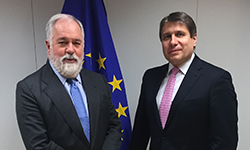 “The European Parliament ENVI Committee's position includes some progress, but also elements of great concern such as the proposed import inclusion mechanism” was part of comments Markus J. Beyrer made today during a bilateral meeting with European Commissioner Arias Cañete. This mechanism risks creating an artificial distortion between sectors. It would also be very difficult to implement in practice and risks triggering economic retaliation from trading partners. With a view to the plenary vote and forthcoming trilogue process, Beyrer called on the Commissioner to make sure the ETS (emission trading scheme) sets the right incentives to reduce industrial emissions, whilst safeguarding industry's competitiveness on the global scale.
“The European Parliament ENVI Committee's position includes some progress, but also elements of great concern such as the proposed import inclusion mechanism” was part of comments Markus J. Beyrer made today during a bilateral meeting with European Commissioner Arias Cañete. This mechanism risks creating an artificial distortion between sectors. It would also be very difficult to implement in practice and risks triggering economic retaliation from trading partners. With a view to the plenary vote and forthcoming trilogue process, Beyrer called on the Commissioner to make sure the ETS (emission trading scheme) sets the right incentives to reduce industrial emissions, whilst safeguarding industry's competitiveness on the global scale.
Contact: Leon de Graaf
More global competiveness will ease social problems
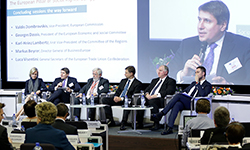 “The persisting social problems in Europe are not due to a lack of social policy measures, but to a lack of global competitiveness. We still need to make half of the way to reduce unemployment to pre-crisis levels. Economic growth, creation of new wealth and expansion of employment are the best answers to citizens’ concerns about the future. We urgently need to progress in improving implementation of national labour market reforms in order to facilitate job creation. Tightening of labour and social security laws would have the opposite effect”, BusinessEurope Director General Markus J. Beyrer said during the conference ‘The European Pillar of Social Rights: Going forward together’ organised by the European Commission on 23 January. Furthermore, EU cross-industry private employers BusinessEurope and UEAPME, together with 11 EU sectoral employer organisations presented a joint statement ‘More competitiveness to sustain the social dimension of Europe’.
“The persisting social problems in Europe are not due to a lack of social policy measures, but to a lack of global competitiveness. We still need to make half of the way to reduce unemployment to pre-crisis levels. Economic growth, creation of new wealth and expansion of employment are the best answers to citizens’ concerns about the future. We urgently need to progress in improving implementation of national labour market reforms in order to facilitate job creation. Tightening of labour and social security laws would have the opposite effect”, BusinessEurope Director General Markus J. Beyrer said during the conference ‘The European Pillar of Social Rights: Going forward together’ organised by the European Commission on 23 January. Furthermore, EU cross-industry private employers BusinessEurope and UEAPME, together with 11 EU sectoral employer organisations presented a joint statement ‘More competitiveness to sustain the social dimension of Europe’.
Photos - Copyright: Maciej Szkopanski
Contact: Rebekah Smith
Maintain the clearing exemption for hedging derivatives
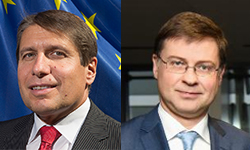 Uphold the existing corporate hedging exemption for non-financial counterparties who use ‘over-the-counter’ (OTC) derivatives for risk mitigation of underlying financial and economic risks from their businesses, BusinessEurope Director General Markus J. Beyrer wrote to Valdis Dombrovskis, Commission Vice-President for the Euro and Social Dialogue, also in charge of Financial Stability, Financial Services and Capital Markets Union. The forthcoming review of the European Market Infrastructure Regulation (EMIR) should not discourage hedging by non-financial companies as this would increase the risk for the individual corporation concerned. In addition, it is important that reporting burdens for non-financial companies are reduced.
Uphold the existing corporate hedging exemption for non-financial counterparties who use ‘over-the-counter’ (OTC) derivatives for risk mitigation of underlying financial and economic risks from their businesses, BusinessEurope Director General Markus J. Beyrer wrote to Valdis Dombrovskis, Commission Vice-President for the Euro and Social Dialogue, also in charge of Financial Stability, Financial Services and Capital Markets Union. The forthcoming review of the European Market Infrastructure Regulation (EMIR) should not discourage hedging by non-financial companies as this would increase the risk for the individual corporation concerned. In addition, it is important that reporting burdens for non-financial companies are reduced.
![]() Contact: Erik Berggren
Contact: Erik Berggren
Towards a better system for waste management in Europe
 Europe needs a more efficient waste management system to recover waste as a valuable resource for both the economy and the environment. The current revision of the waste legislation is an essential step on the circular economy agenda that industry fully supports. However, a number of issues still have to be solved. The vote in the European Parliament Committee on the Environment, Public Health and Food Safety (ENVI) on 24 January does not strike the right balance. BusinessEurope’s views on key issues voted on by ENVI can be found here.
Europe needs a more efficient waste management system to recover waste as a valuable resource for both the economy and the environment. The current revision of the waste legislation is an essential step on the circular economy agenda that industry fully supports. However, a number of issues still have to be solved. The vote in the European Parliament Committee on the Environment, Public Health and Food Safety (ENVI) on 24 January does not strike the right balance. BusinessEurope’s views on key issues voted on by ENVI can be found here.
Contact: Valentina Spina
Europe needs to overcome the challenges to transatlantic data flows
 “A functioning, reliable and sustainable framework for transatlantic data flows is crucial to support innovation and growth” was the main conclusion of Deputy Director Guido Lobrano on 25 January when he moderated the panel ‘Legal Challenges to the International Transfer of Data: Privacy Shield and Standard Contractual Clauses’ at the Computers, Privacy and Data Protection Conference (CPDP 2017). As the Privacy Shield is fast becoming a critical part of transatlantic trade, it is essential that the current legal challenges to data transfers in Europe are properly addressed.
“A functioning, reliable and sustainable framework for transatlantic data flows is crucial to support innovation and growth” was the main conclusion of Deputy Director Guido Lobrano on 25 January when he moderated the panel ‘Legal Challenges to the International Transfer of Data: Privacy Shield and Standard Contractual Clauses’ at the Computers, Privacy and Data Protection Conference (CPDP 2017). As the Privacy Shield is fast becoming a critical part of transatlantic trade, it is essential that the current legal challenges to data transfers in Europe are properly addressed.
![]() Contact: Guido Lobrano
Contact: Guido Lobrano
Horizon 2020 mid-term review
 The European business community has made a number of observations in the context of the interim evaluation process of Horizon 2020, the EU framework programme for research and innovation. Among the main comments: the need to strike the right balance between research and innovation, to improve the calls to address oversubscription and low success rate, and to give more weight to the industrial, economic and societal impact of a funding proposal.
The European business community has made a number of observations in the context of the interim evaluation process of Horizon 2020, the EU framework programme for research and innovation. Among the main comments: the need to strike the right balance between research and innovation, to improve the calls to address oversubscription and low success rate, and to give more weight to the industrial, economic and societal impact of a funding proposal.
![]() Contact: Valentina Spina
Contact: Valentina Spina
BusinessEurope moves its work forward on international patent cooperation
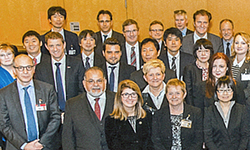 BusinessEurope, with its intellectual property partners from the United States, Japan, China and Korea, held joint meetings at the European Patent Office in Munich with the patent offices from these regions, on 18 and 19 January 2017. The aim of the meetings was to further progress on a common agenda of technical and procedural patent cooperation. The work of BusinessEurope in this field intends to relieve European companies filing globally from unnecessary burden, red tape and excessive costs. Good progress including next steps was made on a number of projects for which patent offices rely on industry’s input and support.
BusinessEurope, with its intellectual property partners from the United States, Japan, China and Korea, held joint meetings at the European Patent Office in Munich with the patent offices from these regions, on 18 and 19 January 2017. The aim of the meetings was to further progress on a common agenda of technical and procedural patent cooperation. The work of BusinessEurope in this field intends to relieve European companies filing globally from unnecessary burden, red tape and excessive costs. Good progress including next steps was made on a number of projects for which patent offices rely on industry’s input and support.
Contact: Ilias Konteas
More clarity needed for geo-blocking proposal
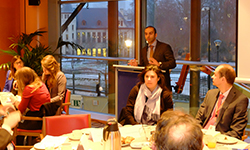 “While removing remaining barriers and fragmentation would be the best way to encourage cross-border e-commerce, more clarity about the rules traders need to apply when complying with the proposed geo-blocking regulation is also essential for both businesses and consumers”, Deputy Director Guido Lobrano said at the European Parliament’s SME Intergroup breakfast on geo-blocking on 24 January. The European Parliament and European Council have presented their views. Now the European Commission has to facilitate reaching a balanced outcome, by providing legal certainty and addressing outstanding issues such as the overall scope. Here the distribution of copyright-protected material needs to be excluded, in order to avoid conflicts with other existing rules.
“While removing remaining barriers and fragmentation would be the best way to encourage cross-border e-commerce, more clarity about the rules traders need to apply when complying with the proposed geo-blocking regulation is also essential for both businesses and consumers”, Deputy Director Guido Lobrano said at the European Parliament’s SME Intergroup breakfast on geo-blocking on 24 January. The European Parliament and European Council have presented their views. Now the European Commission has to facilitate reaching a balanced outcome, by providing legal certainty and addressing outstanding issues such as the overall scope. Here the distribution of copyright-protected material needs to be excluded, in order to avoid conflicts with other existing rules.
Contact: Guido Lobrano
Tax Policy Group meets Maltese Minister of Finance
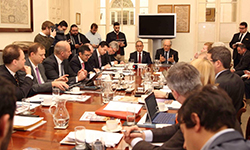 BusinessEurope’s Tax Policy Group encouraged the Maltese Minister of Finance, and current President of the Ecofin Council, Edward Scicluna to seek a swift agreement in the European Council on the double taxation dispute resolution mechanism, which would help to ensure that disputes between two or more member states, claiming corporate tax on the same profit, can be resolved more quickly and decisively. During the meeting, hosted by the Malta Chamber of Commerce, Enterprise and Industry in Valletta, Malta, on 20 January they also discussed the Maltese presidency’s work programme in the area of taxation. The group particularly mentioned the recent proposals for a common (consolidated) corporate tax base, as well as ongoing issues such as the financial transaction tax and tax transparency. The chair of the VAT Group, Kristian Koktvedgaard also had separate meetings with representatives of the Maltese presidency in Brussels on 12 January to discuss the e-commerce and VAT proposal.
BusinessEurope’s Tax Policy Group encouraged the Maltese Minister of Finance, and current President of the Ecofin Council, Edward Scicluna to seek a swift agreement in the European Council on the double taxation dispute resolution mechanism, which would help to ensure that disputes between two or more member states, claiming corporate tax on the same profit, can be resolved more quickly and decisively. During the meeting, hosted by the Malta Chamber of Commerce, Enterprise and Industry in Valletta, Malta, on 20 January they also discussed the Maltese presidency’s work programme in the area of taxation. The group particularly mentioned the recent proposals for a common (consolidated) corporate tax base, as well as ongoing issues such as the financial transaction tax and tax transparency. The chair of the VAT Group, Kristian Koktvedgaard also had separate meetings with representatives of the Maltese presidency in Brussels on 12 January to discuss the e-commerce and VAT proposal.
Contact: Pieter Baert
Calendar
 26 January 2017: meeting of the Eurogroup
26 January 2017: meeting of the Eurogroup- 27 January 2017: Economic and Financial Affairs Council
- 3 February 2017: Informal EU27 summit, Valetta, Malta
- 21 February 2017: "Is the European single market SME-friendly? What do SMEs actually need?" BusinessEurope conference, Brussels